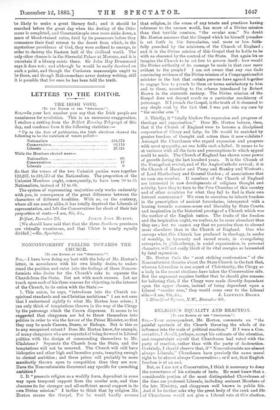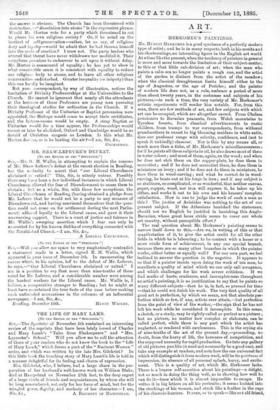RELIGIOUS EQUALITY AND REACTION.
[TO THE EDITOR OF THE " SFEOTATOBI" J SIR,—Your correspondent, Mr. Horton, comments on " the painful spectacle of the Church throwing the whole of its influence into the scale of political reaction." If I were a Con- servative, I should, perhaps, accept his estimate of the situation, and congratulate myself that Churchmen had voted with the party of reaction, rather than with the party of destruction. Certainly, I should observe that, if " Nonconformists are almost always Liberals," Churehmen have precisely the same moral right to be almost always Conservatives ; or if not, that English freedom is at an end.
But, as I am not a Conservative, I think it necessary to deny the correctness-of his estimate of facts. He must -knew that a , considerable portion of the most distinguished Churchmen-43P the time are professed Liberals, including eminent Members-of • the late Ministry, and clergymen well known in public life. And if he further asks why the great body of the rank and file of Churchmen would not give a Liberal vote at this election,
the answer is obvious. The Church has been threatened with I destructiou,—" dissolution into atoms " is the expressive phrase. Would Mr. Horton vote for a party which threatened to cut to pieces his own religious society P Or, if he acted on the instinct of self-preservation—rather, let us say, of religious duty and loyalty—would he admit that he had thrown himself into the scale of reaction? I trow not. The party leaders who uttered that threat have never withdrawn nor modified it. Their corypheas promises to endeavour to act upon it without delay. Mr. Horton is enamoured of equality ; he has yet to show in what conceivable sense it is consistent with equality to reduce one religious body to atoms, and to leave all other religious communities undisturbed. Greater inequality (or iniquity) than this can hardly be imagined.
But your correspondent, by way of illustration, notices the limitation of Divinity Professorships at the Universities to the Church. • He cannot be ignorant that nearly all the attendants at the lectures of those Professors are young men pursuing their theological studies for ordination in the Church. If a Divinity Professor of the Unitarian or Baptist persuasion were appointed, the Bishops would cease to accept their certificates, and the lecture-rooms would be empty. A stray Baptist or Unitarian would for a time appear, the Professorships would sooner or later be abolished, Oxford and Cambridge would be as devoid of Christian exegesis as London. Is this what Mr. Horton desires, or is he beating the air P—I am, Sir, &c.,
OIONIENSIS.



















































 Previous page
Previous page